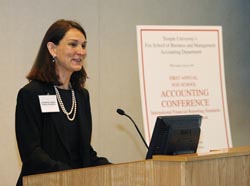|
In welcoming attendees, Banker, the Merves Chair in Accounting and Information Technology at the Fox School, commented on the link between accounting practice and academia.
“One of our goals at the Fox School is to build a strong bridge between the school and the business world, something this conference helps us achieve,” he said.
“Over the next two days we will have a spirited discussion around an issue of contemporary importance as well as share some of the cutting-edge research taking place in our field,” he added. “Gatherings such as this help strengthen the connection between Temple University and the accounting profession. This is just the first of many conferences we plan to hold as we continue to establish the Fox School as one of the top centers of accounting research in the country.”
Fox School Dean M. Moshe Porat echoed those sentiments.
“One of the purposes of this conference is to promote synergy between academia and the greater accounting community,” he said. “With the SEC currently considering the implementation of new U.S. accounting standards in alignment with international standards, our conference today is certainly topical.”
The first day of the conference centered on IFRS, its benefits and challenges, and whether the United States was ready to accept its implementation. The IFRS are accounting standards that many feel will bring much-needed consistency to reported financial data and allow for a better flow of investment capital across national borders. More than 100 countries have already adopted IFRS, with the U.S. being a notable exception.
The two panel discussions were “The Benefits and Challenges of IFRS Worldwide” and “Is the U.S. Ready for IFRS?” Each panel was made up of speakers from the accounting field as well as prominent researchers from prestigious universities, including Mary Barth of Stanford University and the International Accounting Standards Board; Kathleen Bauman of PricewaterhouseCoopers; Scott Hartman of Ernst & Young; Robert Lipe of the Financial Accounting Standards Board; Liza McAndrew-Moberg of the U.S. Securities and Exchange Commission; Paul Munter of KPMG; Sherif Sakr of Deloitte & Touche; Shyam Sunder of Yale University; and Ross Watts of the Massachusetts Institute of Technology.
Most panelists agreed that IFRS offers many challenges, but it also offers many benefits, including the provision of better information to investors and a standardization of practices throughout the world.
“Many of our international clients previously used different standards,” said Bauman, of PricewaterhouseCoopers. “It was like Christmas for me when they all went to IFRS.”
Panelists discussed the concern in the United States that IFRS is too “principle based” in that it establishes broad rules as well as dictates specific treatments. This is in contrast to the U.S. Generally Acceptable Accounting Principles (U.S. GAAP), which as one panelist said, “come in a stack as high as I am tall.”
Watts, of MIT, was the notable skeptic on the first panel, noting that “it’s not clear that one size fits all” when it comes to accounting standards.
“There are variations across countries for good economic reasons, including differences in the organization of firms and the differences in legal arrangements and governments,” he said. “I think the benefits of IFRS are likely to be significantly less than advertised.”
Participants on both panels agreed that, if and when the United States signs on to IFRS (and most expect it will eventually), education will play a large role in its success or failure.
“Corporations will have to be educated, accountants will have to be educated, and colleges will have to change some of their curriculum in the future,” said Ernst & Young’s Hartman.
But the fundamental question remained, is the United States ready for IFRS? The general consensus of the panelists: yes and no.
“We’re not ready but we better start getting ready,” the FASB’s Lipe said. “We have one chance to transition from U.S. GAAP to IFRS, and we need to prepare a blueprint for that transition.”
The accounting conference continued on the second day with six presentations by the following researchers:
- Mary Barth, Stanford, “Accounting Quality: International Accounting Standards and U.S. GAPP”
- Elizabeth Gordon, Temple, “Could IFRS Replace U.S. GAPP? A Comparison of Earnings Attributes and Informativeness in the U.S. Market”
- Shyam Sunder, Yale, “Monopoly or Competition: Standard Setting in the Private and Public Sector”
- Rajiv Banker, Temple, “DuPont Analysis, Sustainability of Competitive Advantage and Valuation”
- Ross Watts, MIT, “Evidence on the Effects of Unverifiable Fair-Value Accounting”
- Jayanthi Krishnan, Temple, “Profitability, Growth, Conservatism and the Reliability of Accounting Numbers”
—Written by Andrew Smith for the Fox School of Business
|
